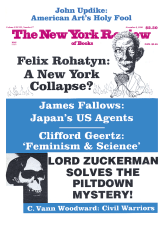In response to:
The War That Will Not End from the August 16, 1990 issue
To the Editors:
Jonathan Mirsky’s article, “The War That Will Not End” [NYR, August 16] is in many ways an interesting piece. One significant point he makes relevant to my book, Slow Burn is that the CIA’s vaunted Phoenix Program was a bust and a fake. Our great intelligence failure in VN was precisely our inability to identify and target members of the Viet Cong’s secret infrastructure. I spent my entire seven years in country attempting to remedy that failure, an effort that would not have been necessary had Phoenix been anything other than a phony from the word go.
However, other points that Mirsky makes, using my book as supposed evidence, are false. My ability to recruit agents and effectively interrogate prisoners was partly based on Viet Cong and North Vietnamese fear that if they didn’t cooperate with me they would find themselves in the clutches of the SVN police, a disturbing unpleasant prospect. But I never said, as Mirsky has me say, that Americans tortured and killed prisoners.
Mirsky also states that I claimed the wives of South Vietnamese officials were involved in the opium trade. I never said such a thing. Many South Vietnamese political and military bigwigs, and their wives, looted the country ruthlessly. The CIA watched them pipe the money to Hong Kong and Switzerland. Some of the loot undoubtably came from drugs, but to make a blanket statement that “the wives of South Vietnamese officials were involved in the drug trade” is misleading and to say that I said it is simply a lie.
Mirsky makes an effort to write a balanced piece with condemnation for everybody, Vietnamese on both sides, and Americans. The United States did plenty in Vietnam that richly deserves condemnation; it wasn’t necessary for him to make anything up. That he did undermines his credibility.
Orrin DeForest
Former Chief Interrogator
Military Region III, 1968–1975
Jonathan Mirsky replies:
In his letter Mr. DeForest accuses me of lying twice. Mr. DeForest insists that he did not say that Americans tortured their prisoners. In fact I said that Vietnamese who did not cooperate with Mr. DeForest or other CIA officials were implicitly threatened with torture and death by Vietnamese or Americans. And on page 55 (galley copy) he refers to the interrogation centers, which had been set up by the CIA, as “my special concern,” and he writes that the centers were “commonly considered the sites of the worst tortures, in particular the water treatment…or the torture in which they applied electric shock to the genitals etc…. I was disgusted by them.” On the next page he describes four Vietnamese interrogators who, while he watched, inserted a broomstick into the vagina of a half-naked young woman. If the torturers were not actually Americans, the centers were CIA installations under American control. In any event, the torture and killing of Vietnamese by Americans is no secret.
As for Vietnamese wives and heroin, Mr. DeForest on page 205 writes that his friend Bill Todd had been “doing intelligence work on the drug trade,” and had tracked drug money to Hong Kong banks. In the very next sentence he says, “For several years he had watched the wives of South Vietnamese political and military figures regularly depositing huge numbers of piastres in the Crown colony.” As Mr. DeForest himself says in his letter, “Some of the loot undoubtedly came from drugs.” As with the torture, this was well known in the late Sixties when I was in Vietnam.
This Issue
November 8, 1990



